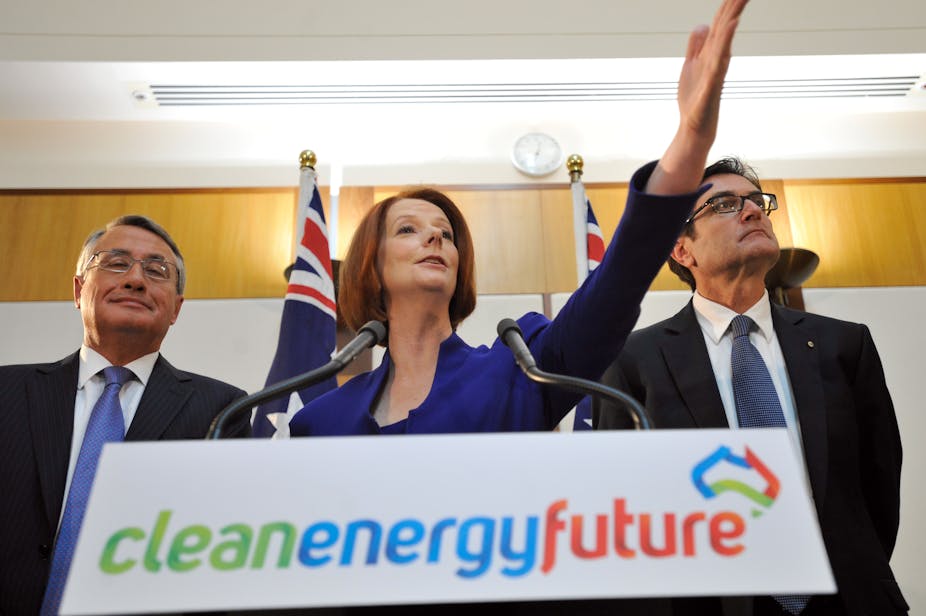Politicians are in the unique position of being able to enact climate policies that can prevent or minimise great harm to millions, if not billions, of people. They have an ethical responsibility to understand the state of climate change science and enact adequate policies to prevent dangerous climate change.
On May 29, MP Rob Oakeshott proposed a motion to Federal House of Representatives “That this House expresses full confidence in the work of Australia’s science community and confirms that it believes that man-made climate change is not a conspiracy or a con, but a real and serious threat to Australia if left unaddressed.”
Oakeshott’s intent was to flush out those who undermine the development of strong climate policies. As he says, “The most offensive part of this [climate] debate to date is the policy process itself that is being challenged-not about climate science but how we as policymakers develop policy.”
In our previous article we focussed on the (un)ethical position of politicians who don’t accept the science of climate change, posing some questions they should answer. (You can see whether your Federal MP and/or Senator supports or denies the findings of climate science here and here.)
Here we focus on politicians who say they support the findings of climate science. Are they responding in an ethically justifiable way? Are they doing enough to prevent dangerous climate change?
On the whole, the simple answers are that politicians are not doing enough and are not recognising the level of change needed in our climate policy. Current Australian and international carbon reduction commitments are nowhere near enough to protect our children, grandchildren and future generations from dangerous climate change.
We hear much talk from politicians along the lines of – “we can’t afford to be among the first to act”. But our historical emissions mean that Australia is more responsible for climate change than 94% of all the countries in the world. Furthermore, our per-capita CO2 emissions are still enormous.
Recent analyses indicate that for Australians to do our fair share, minimum national emissions reduction targets of 25 to 50% by 2020 and 80% by 2050 are required.
The emissions reductions targets put forward by our leading politicians (5% by 2020) make us a nation of “emissions bludgers” using four times as much of the carbon budget as the average global citizen. They mean that Australians are relying on other nations (most of whom are poorer than us) to do more than their fair share to prevent dangerous climate change. The current generations of adults are abandoning our responsibilities and leaving our children and future generations to suffer the consequences of the dangerous climate change we cause.
So much for the Aussie notion of a “fair go” for everyone.
The public has a right to be informed about (and to question) politicians’ justifications for failing to enact scientifically and ethically adequate policies.
Unfortunately, the Australian media has failed to ask politicians who support inadequate climate change policies to justify their position on scientific and ethical grounds. Here is what journalists - and you - should be asking them.
You say you accept the science on climate change. Do you also accept that governments should regulate markets to ensure the protection of our children and future generations from dangerous climate change?
The current bipartisan national emissions reductions targets (5% by 2020) would mean that Australians use four times as much of the carbon budget as the average global citizen. How do you plan to address this moral failure?
Recent analyses indicate that for Australians to do our fair share, minimum national emissions reduction targets of 25 to 50% by 2020 and 80% by 2050 are required. What actions have you taken and will you take to achieve this? What evidence do you have that your climate change policies are capable of delivering emissions reductions of this magnitude?
How can Australia encourage other wealthy high per-capita polluting countries like the USA and Canada to get responsible, stand up to those with vested interests, and do what it takes to protect our children and future generations?
Given that significant climate change will occur, what adaptation policies do you have to help Australian communities cope with the impacts a warming global climate will have on the physical environment (for example, extreme weather events) and on health and wellbeing?
Do you think that governments should take a leading role in guiding the economy’s response to climate change? If you believe this is essentially a market issue, how will markets solve the climate change problem?
Atmospheric ozone depletion and acid rain were both addressed through government regulation of industry. Do you believe governments should take a similarly active role in regulating industry responses to climate change?
The fossil fuel industry already has plans to produce much more CO2 than is considered “safe”. The amount of carbon contained in the proven coal, oil and gas reserves is around 2,795 gigatons. This is three to five times the amount scientists tell us we can pour into the atmosphere by midcentury and still have hope of avoiding dangerous climate change. What policies do you have to address this enormous problem?
Approving more fossil fuel extraction is clearly not compatible with the globally agreed target of limiting climate change to less the 2 degrees Celsius. How do you plan to address this dilemma?
Through granting enormous fossil fuel subsidies, we are paying corporations to do things that endanger our children’s futures. What policies do you have to address this?
We might ask politicians a few of these ourselves. Have a go yourself – and let us know how you get on. We’d be pleased to write about it.

